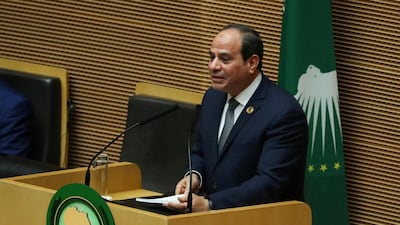There may be no other leader in Egypt’s modern history who has built so much in so little time as President Abdel Fattah El Sisi, a 66-year-old retired general who took the reins in the most populous Arab nation seven years ago.
Described as a hands-on leader with a punishing work schedule and a knack for detail, he has overseen a dizzying array of mega projects that, on completion, could transform the country of 100 million.
The list includes an ultra-modern new capital in the desert, a dozen or more new cities, thousands of kilometres of roads, power stations, water desalination plants and giant solar energy farms.
But Mr El Sisi has said Egypt’s 'renaissance' – the word his supporters use to refer to the country’s overhaul – never received the attention or the appreciation it deserves.
What was required then, some speculated, was a new slogan to capture the attention of the Egyptian people while encapsulating what has been achieved in such a short space of time.
The New Republic
Mr El Sisi appears to have found it, although it is too soon to tell whether it will endure the test of time or resonate with Egyptians, many of whom are too preoccupied with the struggle to make ends meet in the face of soaring prices.
After several casual mentions over the past month, the official birth of the phrase "The New Republic" came in July when Mr El Sisi addressed around 50,000 supporters at an open-air stadium in Cairo.
The event was held to celebrate the launch of a programme worth 700 billion Egyptian pounds ($44 billion) to improve the quality of life for nearly 60 million people.
“I consider it [the project] as the enshrinement of the New Republic … one that commands military, economic, political and social capabilities,” he announced to the cheering crowd.
“I renew my pledge to honour my promise to launch the New Republic that’s born out of your glorious June 30 revolution,” he said.
He was alluding to the 2013 removal by the military of Mohammed Morsi, a divisive Islamist president, amid a wave of street protests against his one-year rule.
The New Republic is not the first catchphrase that the Egyptian leader has coined since Mr El Sisi rose to power, but it has the potential to be the one that will for years be associated with his rule.
Soon after his rise to power in 2013, Mr El Sisi sought to reassure Egyptians then living through the turmoil that embroiled the country after a popular uprising in 2011.
“Egypt is the mother of the world and will be as grand as the world,” he told Egyptians, playing on an old Arabic saying.
That feel-good catchphrase had a good, albeit short, run before it was shelved, but “Long Live Egypt!” which he began to use to wrap up speeches survives as a nationalist rallying cry for unity and hard work.
“A slogan had to be found for this era. There’s also the question of the legitimacy that slogans give to a regime,” said Jehad Auda, a political-science professor at Cairo’s Helwan University.
“’The New Republic’ is a good one. It’s cognitive. It’s what you make it out to be.”
Finding the right slogan for post-monarchy regimes in Egypt is a task whose importance cannot be overstated or dismissed. It fits in with the populist trait found in every government in the last six decades. Its propaganda value is vital, Mr Auda and other analysts say.
But, perhaps more importantly, the latest one signals the departure from the “old” republic, or the political system prevailing since the toppling of the monarchy following a July 1952 military coup.
The new slogan suggests that Mr El Sisi’s government will be expected to provide higher levels of performance in fields other than construction and effectively fight perennial societal ills like apathy, corruption and negligence.
It also gels with a key segment of the Egyptian leader’s political discourse; the supremacy of the state and its institutions and the necessity of protecting them at all costs.
Shady Lewis Botros, a London-based author and political analyst, said he saw in Egypt’s latest slogan echoes of the French republics established since its 1789 revolution, but new constitutional foundations and retooled relations between the state and business had to be laid down with the birth of every one.
“We have had our own republics here in Egypt, but the changes from one to another never touched the essence of governance,” said Mr Botros. “We will see in time whether the new slogan will translate into meaningful political changes.”
The announcement of the new slogan has meanwhile sparked a debate in Egypt’s media, which has focused on the thinking behind it and what it means for the country going forward.
“Announcing a new republic leads one to understand that there is dissatisfaction over the shape, policies and performance of the current republic, meaning the July regime whose principals were never realised,” wrote columnist Mahmoud El Alily in the popular Cairo daily Al Masry Al Yum.
In an article published at the weekend, Mr El Alily said the “thinking methods” of the new republic should have been laid out before its launch.
“And the most important thing is the clarity of vision in the decision-making circles.”

Using political slogans is not unique to Egypt or Arab nations. They are common in the West, although their use is mostly associated with election campaigns, like Barack Obama's “Yes, we can!” or Donald Trump's “America first!”.
In Egypt, Gamal Abdel Nasser, who ruled unopposed between 1954 and 1970, adopted “what has been taken by force can only be retaken by force” following the loss of the Sinai Peninsula to Israel in the 1967 war. The phrase injected hope and defiance in a defeated nation and lives on to this day.
Nasser’s successor Anwar Sadat coined the slogan “Nation of Science and Piety” to distinguish his rule. It is widely believed to have encouraged the rise of extremist Muslim groups in Egypt but is frequently cited today as a defining feature of his 11-year rule.
Sadat’s decision to send troops across the Suez Canal to wrest back control of Sinai in the 1973 war and his historic visit to Israel in 1977 earned him the lofty title of “Hero of War and Peace.”
The title survived his 1981 assassination by extremists and remains linked to his name to this day.
“It’s a smart idea to rally people around a slogan,” Negad Borai, a veteran lawyer and rights campaigner, said of 'The New Republic'.
“It rightly refers to all the mega projects undertaken by the president, but it will remain just a slogan until the benefits of everything that is being done translate into money in people’s pockets.”


